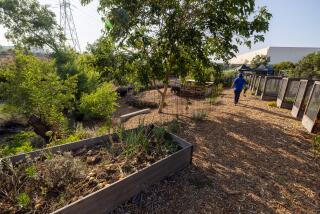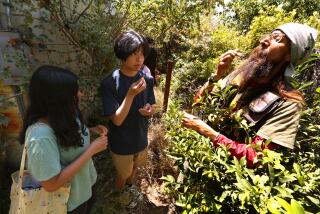Lesson Sources on Environment
- Share via
That there’s controversy over environmental education is old news (Nov. 13). Partisans on every side of every issue have been accusing each other of propagandizing in classrooms since someone calculated that a sixth-grader could be voting in six years. But what they’re criticizing is not environmental education; it’s environmental advocacy. Almost never reported is the good news: that teachers can choose from among dozens of quality environmental education programs for use in their classrooms. All are free from bias, professionally developed by educators, and designed to help students learn how to think, not what to think about environmental issues.
As current president of the North American Assn. for Environmental Education, I know these are the kinds of programs teachers want and use. More than 80,000 come each year, for example, to daylong workshops offered by Project Learning Tree or PLT’s sister program, Project WILD. Good environmental educators are neither ignorant nor uncritical users of every program that arrives in their faculty-room mailbox. Our research suggests they recycle biased materials, or use them as an object lesson for their students. Why? To demonstrate the value of examining all sides of a complex issue.
KATHY McGLAUFLIN
Washington
*
* The most significant issue raised in the article is the privately supplied classroom teaching tools. Companies, foundations and interest groups with a point of view offer teaching materials not only in environmental areas, but also in home economics (a big favorite), computer literacy (maybe the fastest-growing area), science, music, reading, auto shop, math and every other area of education.
Environmental education is booming in Southern California. The County of Los Angeles is mounting a classroom program to communicate information about recycling, including both what recycling is and how to practice it at home. The county is also targeting homes and businesses--in a program I helped plan--with recycling messages. Other environmental education programs under way throughout the state include used-oil recycling, composting and proper handling of household hazardous wastes. None of these programs are the product of activist zeal. They are required to win participation of householders and business operators in waste reduction and pollution prevention programs.
J. LANGE WINCKLER, President
Strategic Environment
Los Angeles
*
* The overwhelming evidence suggests that “crisis” is exactly the right word to describe the state of the world’s environment. Global overpopulation is real. Deforestation is real. Overfishing is real. The ozone hole is real. Pollution is in our oceans, locked in the water table, and in our air. The only people who offer major doubts that protecting the environment must be a top priority are those who profit by activities that contribute to its demise.
Teaching children environmental responsibility comes as a natural part of teaching scientific fact and must be part of all school curricula. The letter-writing campaigns encouraged by caring instructors also teach kids something that is sorely lacking in adults today: citizenship.
ROBERT BADAL
Hollywood
More to Read
Sign up for Essential California
The most important California stories and recommendations in your inbox every morning.
You may occasionally receive promotional content from the Los Angeles Times.













